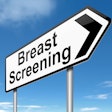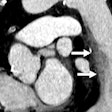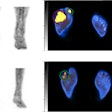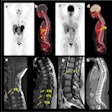With long and sometimes painful experience as their teacher, most healthcare providers and administrators know better than to run afoul of U.S. and state fraud and abuse laws. Now it's imaging vendors' turn as targets for regulators trying to squeeze questionable business practices out of healthcare services.
An increasingly ominous U.S. regulatory environment was the subject of a presentation at the American Healthcare Radiology Administrators conference in Nashville earlier this month. David Ford and Michael Gardener of the Boston healthcare law firm Mintz, Levin, Cohn, Ferris, Glovsky and Popeo talked about how vendors can avoid crossing the increasingly blurry line between aggressive business practices and the government's definition of fraud.
According to Ford and Gardener, there's no question that the U.S. Office of the Inspector General (OIG) has targeted healthcare. For the 12 months ended March 31, 2000, the OIG reported 427 successful criminal actions, 438 individuals and entities charged, 3,500 sanctions, and $1.2 billion recovered from healthcare facilities in the U.S.
"By any measure, enforcement is a growth industry," Ford said.
That's certainly the case for equipment manufacturers, who often think fraud and abuse laws don't apply to them because they don't directly receive or benefit from federal Medicare or state Medicaid payments. In fact, vendors can step into any number of regulatory minefields, including:
- Fraud and abuse statutes that broadly prohibit payments for patient referrals and the inducement of purchases or leases of items and services under U.S. healthcare programs.
- Stark II, which prohibits physician self-referral.
- U.S. laws prohibiting the filing of false reimbursement claims.
Hoping to tap the revenues that come with regulation, many states have enacted similar laws, though they're often inconsistent with federal statutes.
Kickback law
The U.S. fraud and abuse (or anti-kickback) law is designed to prevent the use of financial incentives to influence medical judgment in making patient referrals and purchasing medical products. Regulators can use it to exclude violators from programs operated by the U.S. government, and impose hefty fines on violators.
The anti-kickback law is unique to healthcare, as it may prohibit otherwise common sales practices such as:
- "Free goods" (for example, computers).
- Percentage leases.
- Installment loans for the purchase price.
- Charitable contributions (such as research grants).
- Incentive gifts (vacations, sporting events, etc.).
Of course, there are statutory exceptions that vendors should be aware of. Discounts or other price reductions are fine, as long as they're properly disclosed and appropriately reflected in costs or charges submitted by the provider to a federal healthcare program. That doesn't mean that reporting is the sole responsibility of the discount buyer, however. The government says liability can also rest on the manufacturer if the discount is not contractually disclosed at the time of purchase, Ford said.
The statute is so restrictive that the Department of Health and Human Services (HHS) has identified 13 so-called safe-harbor practices that would clearly not be prosecuted, even though they technically violate the rules. These include investment interests, certain leases and services agreements, and managed care arrangements. The safe harbors are generally too restrictive to be of practical benefit in business, but do provide regulatory relief for activities such as straight percentage discounts and single price points for film/cassette/screen systems. Gardener and Ford estimate that only 10% to 15% of transactions fit within the safe-harbor descriptions.
Severe penalties
The penalties for manufacturers and distributors are severe: They can be excluded from participating in any federal healthcare program. And the penalties apply even to those who do not submit claims to Medicare, but simply supply products or services to Medicare providers. In effect, it prohibits providers from buying products or services from the excluded manufacturer or distributor.
Prebates, also known as up-front rebates or signing bonuses, have recently gotten the OIG's attention. These are sales agreements that manufacturers and distributors enter into with group purchasing organizations (GPOs) and end users in which substantial sums are paid up front when a contract is signed. Future advance payments are sometimes offered as well. There are no refunds if minimum sales levels are not achieved, and they are usually created to establish exclusive relationships.
The OIG ruled in July that prebates are an obvious incentive to induce referrals and are not covered by the discount safe harbor. Because payments are difficult to trace, lock in purchasers, and increase potential over-utilization and interference with cost/quality considerations, the OIG is skeptical of their efficacy.
"They appear to pose a significant risk of fraud and abuse. (Prebates are) suspect under the anti-kickback statute, placing persons offering or receiving them potentially at risk," according to the OIG.
The government’s big stick against manufacturers is the U.S. False Claims Act (FCA), with its mandated fiscal penalties of $5,000 per claim. The act is aimed at preventing submission of false, fictitious, or fraudulent claims for reimbursement to the federal government. It applies to anyone who knowingly presents a false claim, or makes or uses a false statement to get a false claim paid.
The FCA has been extended by court decision to all fraudulent attempts to cause the government to pay money. For example, a contract between a manufacturer and a hospital violates the anti-kickback statute; the hospital then submits a Medicare claim and certifies its compliance with Medicare rules and regulations.
At this point, both the hospital and the manufacturer have violated the FCA on every claim made using the manufacturer’s equipment -- for up to three times damages and for a period covering the preceding ten years. Manufacturers are also potentially liable if they conspire with a healthcare institution to "hide" rebates by actions such as charitable contributions or incentive gifts.
If that's not enough, consider that there's another cop on the playground too: the state attorney general. State laws are often comparable to federal statutes but may not be limited to state healthcare programs such as Medicaid. Their scope is often broader than federal laws, but they usually affect only healthcare facilities, services, or licensed persons. For the most part, state laws do not have HHS safe harbor provisions.
How to stay legal
According to Ford and Gardener, manufacturers and their customers should avoid high-risk transactions such as:
- Vacations and other big-ticket items paid for by vendors (also known as "frequent-flyer" programs).
- "Research funds" and donations with strings attached.
- Free goods not related to the purchased item.
- Undisclosed cash payments or credits.
- "Conversion fees" and "competitor buy-outs."
- Free related, but big-ticket, equipment (such as non-specialized computers).
- "Up-front rebates" or "signing bonuses."
Manufacturers should use caution whenever a business partner is a provider of goods or services to federal healthcare programs (so-called "reverse referrals"), according to Ford and Gardener.
They should seek shelter in designated safe harbors wherever possible. Consistent and clearly defined fair-market values should be defined for specific products in specific markets. Mechanisms should be created to disclose and report all discounts and price reductions, and volume-based pricing mechanisms carefully scrutinized. Finally, it's a good idea to consult a lawyer before attempting to wade through the morass of U.S. and state regulatory statutes.
By Jonathan S. BatchelorAuntMinnie.com staff writer
August 31, 2000
Let AuntMinnie.com know what you think about this story.
Copyright © 2000 AuntMinnie.com



















